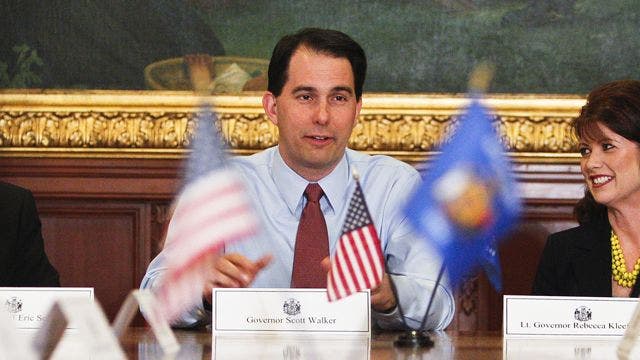
"We aren't going to go away. We're not going to pull a blanket over our head and pee in our pajamas."
Marty Beil, executive director of the Wisconsin State Employees Union, talking to the Milwaukee Journal-Sentinel about the loss of the power to strike and force state workers to pay dues.
The Wall Street Journal today reports that the American Federation of State, County and Municipal Employees, the largest part of the AFL-CIO, has been shedding members even faster than overall public-sector job losses.
A 50,000-member drop from March 2011 to February 2010 may not sound like a big deal for an organization that boasts 1.37 million members and is surpassed in size only by the Service Employees International Union, which represents service workers, such as busboys and hospital orderlies, as well as government workers.
But this is a very big deal as it relates to the next decade of American politics. After decades of growth, the most important part of the Democratic coalition – unionized government workers – has started to slide.
The decline comes from several sources.
First, the overall decline in the number of government jobs – a decline of about 1 percent nationally. While it may not be easy to fire an AFSCME member from a civil service position, it may be possible that state and local lawmakers have allowed attrition to hit harder in job categories with high union membership.
But there is also a growing effort in jurisdictions across the country to reduce the power of the group and other government-worker collectives – most importantly, the power to force government workers to pay dues.
In Wisconsin Tuesday, voters spared Gov. Scott Walker from a labor-led effort to remove him for office for having enacted a crackdown on government unions. Much of the discussion in the state and nationally was about the end, after 50 years, of the power of collective bargaining (i.e. to go on strike) for state workers.
Wisconsin led the nation in expanding such powers, and now has curtailed them. Prior to the middle of the last century it was considered inappropriate by most to give those paid by taxpayers and already protected by civil service regulations the additional power to shut down public services in a contract dispute.
That’s mostly a philosophical argument, though. Yes, the power to go on strike may have driven higher pay and better benefits for some workers, but most of the gains in those regards have come not by workers picketing, but through politicians pocketing contributions.
The biggest practical effect of Walker’s law, and the ones that preceded it and succeeded it around the nation, comes not in collective bargaining but in mandatory dues payments. Prior to Walker’s law, the state acted as an agent for AFSCME and other unions, automatically collecting dues directly from worker paychecks.
Whether a government worker opted to join the union or not, the money came out. Unions defend the practice of compulsory dues payments on the grounds that if dues were optional, workers would opt out in droves and sap the power of the organization.
It turns out that they were right. For the AFSCME local in Wisconsin that covers many of the state workers, membership dropped nearly 70 percent in the first year under Walker’s law. Formerly forced to share their salaries with the union, government workers opted to keep the dough instead.
Even as AFSCME, SEIU and others have been racking up new members in jurisdictions with liberal laws regarding government worker unions, like California, Illinois and New York, the tide is going out in Wisconsin, Indiana, Florida and other places with more conservative laws.
This is a big deal for Democrats. While President Obama is able to raise plenty of money for himself by tapping well-heeled Democrats on Wall Street, in the entertainment industry and elsewhere, Democrats from county clerks to U.S. senators will need billions of dollars over the next decade to stay in power. You can’t get elected superintendent of schools by raffling off dinner with George Clooney. You need the money that comes from the dues paid by the teachers whom you oversee.
The cycle for five decades has been that unions support the campaigns of Democrats who promise to expand the power of unions. Thus empowered, the unions have more money with which to elect more Democrats who further expand union powers. And so it goes.
Or, so it went.
The lousy economy, looming pension problems and frustration with the nation’s unionized educational system have prompted voters to look afresh at how much power such unions should have. The shattered budgets in states and localities have prompted desperation so severe that even some Democrats are willing to buck the unions.
Democrats rake in huge sums as an indirect subsidy from taxpayers. You pay your property tax, your property tax funds county government payrolls, your county government gives a slice of that money to AFSCME and AFSCME gives some to like-minded politicians to stay in office.
So lucrative has this cycle been that Democrats could hardly function today without compulsory dues payments for state and local government workers. But after a half-century of government union growth, the decline has begun.
This is bad news for organized labor overall, which has seen private-sector membership collapse in the past three decades and relied increasingly on public-sector dues payments. But it is even worse news for Democrats.
Unions are looking for new models of viability – organizing low-skill workers, focusing on new immigrants, etc. But Democrats have come to rely so heavily on the party’s symbiosis with government-worker unions, an accelerating decline in the fiscal crisis facing so much of the nation would prove disastrous.
SOURCE: Fox News
No comments:
Post a Comment